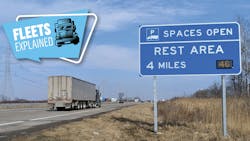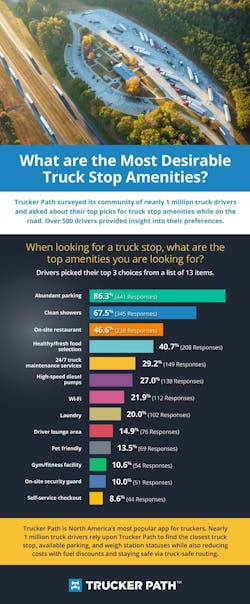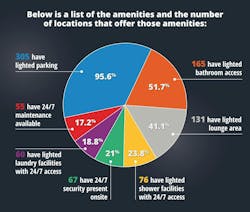Fleets Explained: What’s the deal with truck parking?
Ask any long-haul truck driver about job problems, and you’ll inevitably hear about truck parking. This issue isn’t a common concern for the general public, but it's a major struggle for truck drivers and the rest of the industry. Sparse truck parking nationwide creates safety concerns for truck drivers and operations and efficiency challenges for fleets.
While funding and research have gone into expanding truck parking availability in recent years, there’s more to the issue than just needing more spaces for drivers to safely rest and abide by federal hours of service rules. This Fleets Explained article lays out why truck drivers need parking, the current state of U.S. truck parking, regulations, types of truck parking, truck parking tools, and amenities.
This is part of FleetOwner's Fleets Explained, a Trucking 101 series to break down aspects of the trucking and fleet management industries. You can read more from the series, launched in May 2024, at fleetowner.com/fleets-explained. To submit topic ideas, clarifications, and corrections, email [email protected].
Why do truck drivers need specific parking?
When truck drivers struggle to find parking, multiple problems are created. First, if truck drivers have to look for parking for an extended period of time, this can create hours-of-service violations. Federal hours-of-service rules exist that dictate how long truck drivers can drive before being required to take short and long breaks. So not only are drivers stressed about finding safe parking, but they’re also worried about the ticking clock during their search.
If truck drivers can’t locate safe, authorized parking, they may be forced to park in unsafe or illegal locations, such as highway shoulders, exit and entrance ramps, or unsafe, unsecured areas. Doing so puts the driver’s safety in jeopardy.
"The lack of safe and accessible truck parking places an enormous and costly burden on our nation's truck drivers as they work to deliver for the American people,” Chris Spear, American Trucking Associations’ president and CEO, said in 2023. “Given the chronic nature of this issue and its national scope, it is imperative Congress takes action to provide dedicated funding to expand commercial truck parking capacity.”
The current state of truck parking
While there have been efforts to improve truck parking availability in recent years, truck parking remains a top industry concern.
Truck parking ranked as the industry's second biggest concern for the second consecutive year in the American Transportation Research Institute’s 2024 Top Industry Issues report. Professional drivers, however, ranked parking as their top concern. The truck parking issue has ranked among ATRI’s top five concerns annually since 2015.
In the past four years, the federal government, including the Biden administration, the Department of Transportation, and the Federal Highway Administration, has put more focus on creating more available truck parking, typically through funding for construction projects. In 2024, the federal government made the following truck parking advancements:
- January: DOT to invest $300M for truck parking projects in Florida, Missouri, Pennsylvania, California, Oregon, Washington, and Wisconsin.
- June: House spending bill funds truck parking, bars speed limiter mandates
- July: House funding bills make major trucking policy calls
- October: DOT awards $30 million to create truck parking, rest areas
But some of the funding above is still pending, and truck parking improvements are not quickly completed. So while these improvements are promising, there’s still a lot of work needed to improve the availability and quality of truck parking in the U.S.
What are truck parking regulations?
Multiple regulations exist on the local, state, and federal levels to assess the truck parking situation in the U.S. and provide additional funding to improve the situation. Here are a few of the federal truck parking regulations in the U.S.:
- Jason’s Law: Jason’s Law, enacted in 2012, is named for Jason Rivenburg, a truck driver shot and killed in 2009 after he parked in an unsafe location. The Federal Highway Administration stated that Jason’s Law requires the Department of Transportation to issue a truck parking survey and assessment every few years. The DOT conducted previous surveys in 2015 and 2019.
- The Truck Parking Safety Improvement Act: Introduced in 2023 and championed by the American Trucking Associations, this act would create a $755 million federal grant program dedicated to truck parking expansion. This bill has been introduced but has not yet been passed by the House or Senate.
- The Bipartisan Infrastructure Law: According to the Federal Transit Administration, this law authorizes up to $108 billion for public transportation. This law has included funding to support expanding truck parking.
What are the types of truck parking?
Truck parking may seem straightforward, but it can actually be defined by multiple categories:
- Location: Truck parking can be found in multiple locations, including rest stops, truck stops/travel centers, gas stations, certain restaurants like Cracker Barrel, paid truck parking locations, and more. These different locations come with varying types of amenities.
- Free vs. paid: While truck parking has traditionally been free, paid truck parking is becoming more common. Truck drivers have to weigh the pros and cons of each option; free truck parking doesn’t include any fees, but availability and amenities are not always guaranteed. With paid truck parking, truck drivers can often make reservations for guaranteed parking with often more amenities but at a price. The topic of paid truck parking has recently become more controversial on social media platforms such as LinkedIn and Reddit, as truck drivers voice their concerns about companies allegedly purchasing truck parking spaces that were previously free and charging truck drivers to park in those spaces.
- Truck yards: Truck yards are another form of private, paid truck parking. But truck yards offer more permanent locations for trucks and trailers to be stored and moved. Truck yards typically have heightened security compared to other free and paid parking options.
What kind of truck parking tools are available?
To help combat the lack of available truck parking, companies have come up with multiple tools and resources that drivers can use. Here are some of the following tools:
- Trucker Path: The Trucker Path app helps drivers find truck stops with amenities, weigh stations, and cheap fuel. The app also offers GPS navigation, fuel discounts, and more.
- AllStays Truck & Travel: The AllStays Truck & Travel app helps drivers locate different kinds of available truck parking, weigh stations, truck washes, and more.
- iExit Trucks: The iExit Trucks app helps drivers find truck stops with amenities, repair service centers, weigh stations, and other truck-friendly businesses.
- Private company apps: Multiple companies like Truck Parking Club and Pilot Flying J have apps that allow truck drivers to reserve truck parking, though at a cost.
What kind of truck parking amenities do truck drivers care about?
Available amenities vary across truck stops, rest stops, paid parking, etc. A lack of certain amenities is a common problem truck drivers experience, especially women drivers who care more about certain amenities than male drivers.
According to a Trucker Path survey from April 2024, truck drivers most care about the following amenities:
But women truck drivers favor amenities that promote safety. According to a Trucker Path survey from the fall of 2024 that surveyed women drivers, women drivers care most about the following amenities:
- Lighted parking
- Lighted bathroom access
- Lighted lounge area
- Lighted shower facilities with 24/7 access
- Lighted laundry facilities with 24/7 access
- 24/7 security present on site
- 24/7 maintenance available
Trucker Path then identified 320 truck stops within its network that have at least one of those amenities:
Of the truck stops that completed the survey, only 14 offer all seven amenities female truck drivers look for.
About the Author

Jenna Hume
Digital Editor
Digital Content Specialist Jenna Hume joined FleetOwner in November 2023 and previously worked as a writer in the gaming industry. She has a Bachelor of Fine Arts degree in creative writing from Truman State University and a master of Fine Arts degree in writing from Lindenwood University. She is currently based in Missouri.


